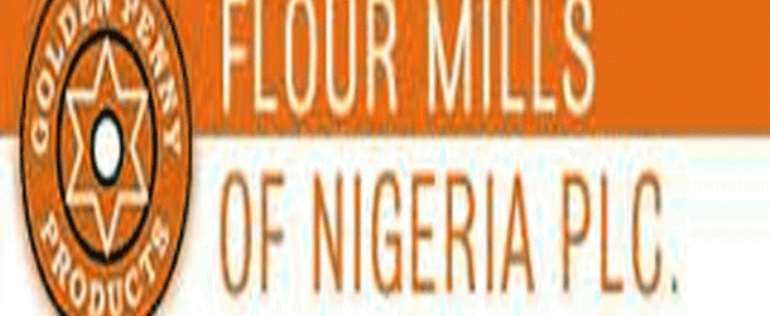Flour Mills slows down on profit growth- THE CITIZEN Analysis

Flour Mills of Nigeria Plc's third quarter report for the period ended December 2012 shows a significant slow down in profit growth from the growth rate recorded in the previous quarter. The company maintained its growth rate in sales revenue during the period with turnover growing by 49.4% from N137.59 billion in the second quarter to N205.51 billion in the third. After tax profit, however, failed to keep pace with revenue growth at an improvement of 6.7% from N7.66 billion in the second quarter to N8.17 billion in the third.
The company's third quarter earnings performance was also a marginal improvement over the corresponding records in the preceding year. Sales revenue improved by just 1.6% over the third quarter figure in December 2011 and after tax profit was flat.
The slow down in profit growth in the third quarter is a reflection of increases in the cost of sales and interest expenses - costs largely outside the company's control. Cost of sales claimed a higher proportion of sales revenue at 87.3% at the end of the third quarter, up from 85.4% in the corresponding period last year. That resulted in a decline of 11.4% in gross profit margin, which lowered gross profit to N26.08 billion.
Finance charges grew far ahead of revenue at 20.2% in the third quarter to N8.86 billion. It therefore claimed an increased share of sales revenue at 4.3% compared to 3.6% in the corresponding quarter last financial year and 3.2% at the preceding full financial year.
The rise in interest expenses was significantly compensated by a bid leap in investment income during the review period. Investment income had advanced from only N285 million in the third quarter of the preceding year to about N4.10 billion in the latest earnings report.
The other key cost elements within the control of the company showed moderation during the period. The strength that even prevented profit from declining was provided by the management's success in controlling selling/distribution expenses and administrative cost.
At N2.56 billion, selling/distribution expenses, as a proportion of sales revenue, was unchanged at 1.2% over the review period. This is a sharp decline from 2.9% recorded at the company's 2011/12 full year in March 2012.
The main cost management success of the company during the period was in respect of administrative expenses. Administrative cost declined by 11.8% to N7.72 billion to claim a reduced share of sales revenue at 3.8% compared to 4.3% in the comparable quarter last financial year. Administrative expenses represented 5.3% of sales revenue in the company's last full year result.
The company is expected to step up both revenue and profit growth in its final quarter, which is its critical earning period. At N8.17 billion, its after tax is almost at par with the last full year record of N8.21 billion. If the third quarter growth rate is maintained to full year, the company may grow after tax profit by about 60% to a three-year high at over N13 billion.
After tax profit had declined for the second year last financial year from N10.09 billion in March 2011 and further from the all time peak of N13.37 billion in 2010. Net profit margin had declined over the period from 8.5% in 2010 to 6.2% in 2011 and further to 3.2% in 2012. Net profit margin improved at 5.6% in the second quarter but has declined to 4.0% in the third.
The company earned N3.19 per share at the end of the third quarter and full year outlook indicates earnings per share in the region of N5.44. This is a recovery from the earnings per share figure of N3.30 for the 2011/12 full financial year. It paid a cash dividend of N1.60 per share in the preceding year, a pay-out ratio of 48.5%. Based on that pay-out ratio, cash dividend for 2012/13 full financial year is expected to come to about N2.65.
Significant changes in the company's balance sheet during the period include the 41.5% rise in inventory to N71.06 billion. The effect of that on the cash flow seems to have been countered by the flat growth in trade and other receivables, a 30.7% advance in trade payables and a 71.3% surge in other payables.
A 33.4% increase in term loan to N38.68 billion explains the surge in interest charges during the period. This is somewhat countered by a drop of 26.9% in bank overdraft, which amounted to N24.58 billion at the end of the quarter. There was also the doubling of unsecured fixed rate bond at N7.5 billion, which also added to the pressure of interest cost on revenue.
Meanwhile, Flour Mills was admitted into the market makers' group of the Nigerian Stock Exchange last week. It has also announced its merger plan with Niger Flourmills. The company's stock, which opened this year at N65 on January 2nd, has gained 24.5% at its last week's closing price of N80.91.
